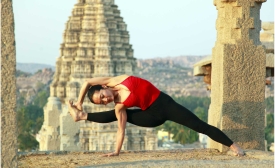narendra modi
Prime Minister Narendra Modi will ask New Delhi's envoys in over 160 countries to focus on economic diplomacy to help government attract investment and transform the 'Make-in-India' campaign a success to boost growth during the annual heads of missions conference that started in Delhi on Friday.
Hometown diplomacy mixed with a Silk Road touch is expected be part of Chinese President Xi Jinping's reciprocal gesture when Prime Minister Narendra Modi visits China before end of May.
Pointing out that PM Modi has put soft power or public diplomacy to optimal use, Dasgupta said that instances of this are evident from Modi's visit to the US and Australia, when he reached out to the Indian diaspora there by showing the international community the popularity he enjoys among them.

Peter Martin's contribution to Foreign Affairs on how the Modi Administration is strategically using India's intellectuals, emigrants, and yogis to enhance the country's soft power.
Climate change has been at the forefront of the president’s recent diplomatic agenda. It should stay there. This week, U.S. President Barack Obama made his second visit to India. As during his trip to China last year, where he signed a landmark agreement to reduce greenhouse gas emissions, climate change ranked near the top of the agenda.
President Obama, in India for a state visit, was chided by local press after he was spotted chewing gum during Monday’s Republic Day parade, which celebrates the day that India’s 1950 constitution went into effect.
India has long seemed unable or unwilling to become a major player on the world stage. But the country’s prime minister, Narendra Modi, is looking to change all that. In order to compensate for a small and weak foreign service, he is tapping into India’s considerable soft power: its emigrants, intellectuals, and yogis.







